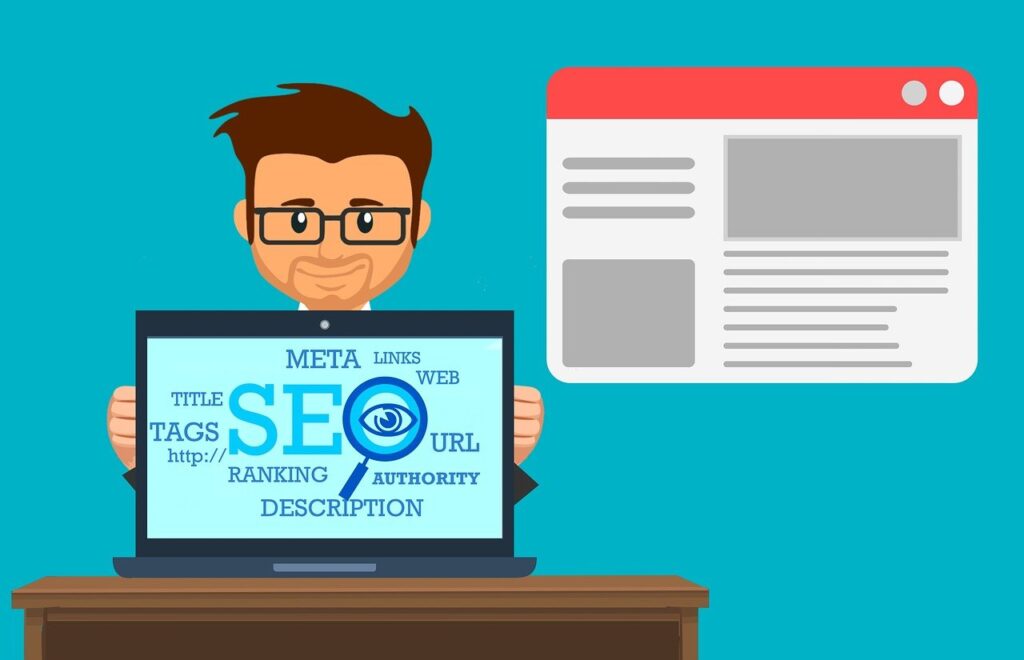Understanding the Relationship Between SEO and Social Media Marketing.
Here are some basic things to Know…
- Search engines like Google consider social media presence when ranking websites.
- Quality Backlinks: Social media can help generate backlinks to improve SEO rankings.
- Increased Brand Visibility: Social media platforms are ideal for increasing brand visibility.
- Keyword Research: Social media can provide insights into trending keywords for SEO efforts.
- Content Distribution: Sharing SEO-optimized content on social media can drive traffic to the website.
- Engagement Metrics: High engagement on social media can boost the website’s SEO performance.
- Local SEO: Social media profiles can enhance local SEO efforts by providing location-specific information.
- Social Signals: Likes, shares, and comments on social media can impact SEO rankings.
- Cross-Promotion: Integrating SEO and social media strategies can lead to a more cohesive online presence.
- Competitor Analysis: Monitoring competitors’ social media activity can inform SEO strategies.

Social media and SEO are interconnected in various ways, making it essential for businesses to integrate these two marketing efforts for optimal results. By understanding how social media influences SEO, businesses can create a comprehensive digital marketing strategy that improves online visibility and drives organic traffic to their websites.
Read Also: SEO and Social Media Marketing
Identifying Key SEO and Social Media Strategies
- Research Relevant Keywords: Conduct keyword research to identify terms and phrases that are commonly used by your target audience. Utilize tools like Google Keyword Planner or SEMrush to discover high-ranking keywords within your industry.
- Optimize Social Media Profiles: Ensure that your social media profiles are complete and include relevant keywords in the bio sections. This will help improve your visibility in both search engine results and on social media platforms.
- Create High-Quality Content: Develop engaging content that is optimized for both SEO and social media. This includes blog posts, images, videos, and infographics that are shareable and valuable to your audience.
- Utilize Hashtags: Incorporate relevant hashtags into your social media posts to increase visibility and reach a broader audience. Research popular hashtags within your niche and use them strategically in your posts.
- Monitor and Analyze Performance: Regularly track the performance of your SEO and social media efforts using tools like Google Analytics and social media analytics platforms. Analyze metrics such as website traffic, engagement rates, and conversion rates to identify successful strategies.
- Engage with Your Audience: Foster relationships with your followers by responding to comments, messages, and mentions. Engaging with your audience not only builds trust but also increases your brand’s visibility on social media platforms.
- Collaborate with Influencers: Partnering with influencers in your industry can help amplify your reach and improve your social media presence. Identify relevant influencers with a strong following and engage them in promotional activities.
- Stay Updated on Trends: Keep abreast of the latest trends in both SEO and social media marketing. Algorithms and best practices are constantly evolving, so staying informed will help you adapt your strategies for optimal results.
By implementing these key strategies, businesses can effectively integrate their SEO and social media marketing efforts to improve brand visibility, reach a wider audience, and drive more traffic to their websites.
Optimizing Social Media Profiles for SEO
- Keyword Optimization:
- Include relevant keywords in the profile bio, About sections, and descriptions to improve search engine visibility.
- Use trending keywords related to the industry to attract more organic traffic.
- Complete Profiles:
- Fill out all the fields in the social media profiles, including contact information, website links, and business details.
- Ensure consistency in information across all platforms for better SEO performance.
- Use of Backlinks:
- Include backlinks to the company website or relevant content in the social media profiles.
- This not only drives traffic to the website but also improves SEO rankings.
- Engagement and Interaction:
- Regularly engage with followers, reply to comments, and encourage discussions on social media posts.
- Higher engagement rates boost social media visibility and indirectly impact SEO.
- Optimized Images and Videos:
- Use relevant keywords in image alt text, file names, and video descriptions to improve search engine optimization.
- High-quality and optimized media content can attract more users to the profiles.
- Track and Analyze Performance:
- Use analytics tools provided by social media platforms to track the performance of posts and profiles.
- Analyzing data helps in understanding what works best and refining strategies for improved SEO.
- Social Sharing:
- Encourage users to share content from social media profiles, as this increases visibility and drives more traffic.
- Shares and mentions contribute to a stronger social presence, which positively impacts SEO efforts.
By implementing these strategies, businesses can optimize their social media profiles for SEO and improve their online visibility and reach.

Using Social Signals for SEO Rankings
Social signals play a crucial role in SEO rankings, as search engines consider social media engagement as a factor when determining the credibility and relevance of a website. Here’s how to leverage social signals for improved SEO rankings:
- Quality Content Sharing: Sharing high-quality content on social media platforms can increase visibility and drive traffic to your website. Engaging posts that encourage likes, shares, and comments can boost social signals and improve SEO.
- Build a Strong Social Media Presence: Developing a strong presence on social media platforms such as Facebook, Twitter, Instagram, and LinkedIn can enhance your online visibility and authority. Regularly engaging with your audience and sharing valuable content can generate social signals that positively impact your SEO efforts.
- Encourage Social Engagement: Encouraging social engagement through contests, polls, and interactive posts can increase likes, shares, and comments on your social media accounts. These interactions send signals to search engines that your content is valuable and relevant, potentially improving your search rankings.
- Incorporate Social Sharing Buttons: Make it easy for visitors to share your content on social media by incorporating social sharing buttons on your website. This can increase the likelihood of your content being shared across various platforms, leading to improved social signals and enhanced SEO performance.
- Monitor Social Metrics: Track metrics such as likes, shares, comments, and follower growth to understand how your social media efforts are influencing your SEO performance. Use this data to refine your social media strategy and optimize your content for better engagement and search visibility.
By effectively leveraging social signals through quality content, strong social media presence, encouraging engagement, incorporating social sharing buttons, and monitoring social metrics, businesses can enhance their SEO rankings and improve their online visibility.
Creating SEO-friendly Social Media Content
- Use relevant keywords in your social media posts to increase visibility on search engines.
- Ensure that your social media profiles are optimized with keywords related to your business or industry.
- Include hashtags in your posts to improve searchability and reach a wider audience.
- Post high-quality content that is engaging and shareable to encourage user interaction and increase visibility.
- Incorporate links to your website or blog in your social media posts to drive traffic and improve SEO.
- Utilize analytics tools to track the performance of your social media content and make adjustments as needed to improve SEO.
- Collaborate with influencers or industry experts to create content that is both engaging and SEO-friendly.
- Engage with your audience through comments and messages to build relationships and improve visibility on social media platforms.
- Consistently monitor trends and updates in social media algorithms to ensure that your content remains optimized for SEO.
- Experiment with different types of content, such as videos or infographics, to see what resonates best with your audience and improves SEO performance.
Read Also: SEO and Social Media Marketing
Utilizing Hashtags and Keywords for SEO and Social Media
- Use relevant keywords and hashtags in your social media posts to improve search engine optimization (SEO) and reach a wider audience.
- Conduct keyword research to identify popular terms related to your industry and incorporate them naturally into your social media content.
- Utilize trending hashtags that are relevant to your posts to increase visibility and engagement on social media platforms.
- Create a consistent hashtag strategy for your brand to increase brand awareness and make it easier for users to discover your content.
- Monitor the performance of your hashtags and keywords to see which ones are driving the most engagement and adjust your strategy accordingly.
- Incorporate long-tail keywords in your social media posts to attract more specific and targeted traffic to your website.
- Remember to use a mix of broad and niche keywords to capture a wide range of potential customers while still reaching a specific target audience.
“By strategically using hashtags and keywords in your social media posts, you can improve your SEO efforts and reach a larger audience online.”
Stay consistent with your keyword and hashtag strategy to see long-term improvements in your social media and SEO performance.
Engaging with Followers to Boost SEO Performance
- Building a strong connection with your followers on social media platforms is crucial for enhancing your SEO performance. Engaging with your audience not only increases brand loyalty but also boosts your online visibility.
- Respond to Comments and Messages Promptly: Acknowledging and responding to comments and messages from your followers in a timely manner shows that you value their feedback and encourages further interaction.
- Encourage User-Generated Content: Encouraging your followers to create and share their content related to your brand can increase engagement and organic reach. User-generated content can also attract new followers and improve your SEO rankings.
- Host Contests and Giveaways: Hosting contests and giveaways on social media is an effective way to engage with your audience and generate buzz around your brand. This can lead to increased visibility and traffic to your website, ultimately benefiting your SEO efforts.
- Share Valuable Content: By consistently sharing valuable and relevant content with your followers, you establish your brand as a knowledgeable authority in your industry. This not only keeps your followers engaged but also attracts new followers and improves your SEO performance.
Engaging with your followers on social media not only has a positive impact on your brand image but can also significantly enhance your SEO performance. By fostering meaningful interactions and creating valuable content, you can build a loyal community of followers who will actively support and promote your brand online.
Use AI tool like blogseo Its an AI writer designed specifically for content generation.
Measuring SEO and Social Media Success
In order to do thius properly,…
- Utilize Analytics Tools:
- Implement analytics tools like Google Analytics, Google Search Console, and social media insights to track the performance of SEO and social media efforts.
- Monitor Key Metrics:
- Keep an eye on metrics such as website traffic, bounce rate, keyword rankings, social media engagement, conversions, and follower growth.
- Set KPIs:
- Define key performance indicators (KPIs) for both SEO and social media, such as organic traffic growth, click-through rates, social shares, and lead generation.
- Track Conversion Rates:
- Measure how many website visitors from SEO and social media channels are converting into customers or leads.
- Monitor Brand Mentions and Backlinks:
- Track the number of brand mentions and backlinks generated from social media campaigns and SEO efforts to assess brand visibility and authority.
- Compare Performance Over Time:
- Analyze data regularly to see how SEO and social media performance trends change over time and make strategic adjustments accordingly.
- A/B Testing:
- Conduct A/B tests for different SEO and social media strategies to determine what works best for driving traffic and engagement.
- ROI Calculation:
- Calculate the return on investment (ROI) for SEO and social media marketing campaigns to evaluate the cost-effectiveness of each channel.
- Reporting and Communication:
- Prepare regular reports showcasing the impact of integrated SEO and social media efforts on overall business goals and communicate the results to stakeholders effectively.
By effectively measuring the success of SEO and social media marketing efforts, businesses can make data-driven decisions to optimize their strategies and achieve higher visibility, engagement, and conversions.

Integrating SEO and Social Media in Campaigns
- Optimize Social Profiles: Ensure that social media profiles are fully optimized with relevant keywords, descriptions, and links to improve search visibility.
- Share SEO-Friendly Content: Share content on social media platforms that is optimized for search engines by incorporating relevant keywords and providing valuable information to the audience.
- Encourage Engagement: Engage with followers on social media platforms to boost user interaction, which can lead to increased visibility and higher search rankings.
- Utilize Social Signals: Social signals, such as likes, shares, and comments, can impact search engine rankings, so encourage followers to engage with your content.
- Cross-Promote: Promote your website content on social media and vice versa to drive traffic between platforms and increase visibility.
- Monitor Performance: Keep track of key metrics such as website traffic, social media engagement, and keyword rankings to measure the success of your integrated SEO and social media efforts.
- Collaborate with Influencers: Partner with social media influencers to amplify your content reach, increase brand awareness, and improve your SEO efforts through backlinks and social mentions.
- Use Keywords Strategically: Incorporate keywords strategically in social media posts, bios, and descriptions to boost search visibility and attract a relevant audience.
- Stay Consistent: Maintain consistency in branding, messaging, and posting frequency across both SEO and social media channels to build a strong online presence.
- Monitor Trends: Stay updated on SEO and social media trends to adapt your strategy and stay ahead of the competition.
Future Of SEO and Social Media Marketing
- AI Integration:
- AI will continue to play a significant role in both SEO and social media marketing. Algorithms will become more sophisticated in understanding user behavior and preferences, allowing for more personalized and targeted content.
- Voice Search Optimization:
- With the rising popularity of voice assistants like Siri and Alexa, optimizing content for voice search will be crucial. Marketers will need to focus on conversational keywords and long-tail phrases to align with how people are searching using voice commands.
- Video Content Dominance:
- Video has already seen a surge in popularity on social media platforms, and this trend is expected to continue. Marketers will need to create more video content to engage audiences effectively and improve SEO rankings.
- Influencer Collaboration:
- Influencer marketing will remain a key strategy in social media marketing, with influencers playing a vital role in promoting products and services. This trend is likely to grow as consumers seek authentic and trustworthy recommendations from influencers they follow.
- Mobile Optimization:
- As mobile usage continues to rise, ensuring websites are mobile-friendly will be crucial for both SEO and social media marketing efforts. Marketers will need to focus on creating seamless mobile experiences to improve user engagement and search rankings.
- Local SEO Emphasis:
- With the increasing importance of local search results, businesses will need to optimize their content for local SEO. This includes creating location-specific content and leveraging local listings to improve visibility in local searches.
Extra Tips
In addition to the points mentioned above, here are some additional tips for successfully integrating SEO and social media marketing:
- Develop a comprehensive digital marketing strategy: Align your SEO and social media goals with your overall business objectives.
- Focus on creating high-quality content: Content is king! Create valuable and informative content that resonates with your target audience and is optimized for both search engines and social media sharing.
- Be patient and consistent: Building a strong online presence takes time and effort. Be patient with your SEO and social media efforts and remain consistent in your approach.
- Measure and analyze your results: Regularly track the performance of your SEO and social media campaigns to identify what’s working and what’s not. Use this data to refine your strategies and optimize your content for better results.

By following these tips and staying up-to-date on the latest trends, businesses can leverage the power of SEO and social media marketing to achieve online success.
Conclusion
By integrating SEO and social media marketing efforts, businesses can create a powerful online presence that attracts a wider audience, drives website traffic, and ultimately boosts conversions. By implementing the strategies outlined in this article, businesses can leverage the strengths of both SEO and social media to achieve their digital marketing goals. Remember, SEO and social media are constantly evolving, so staying informed about the latest trends and adapting your strategies accordingly is crucial for long-term success.
Read Also: SEO and Social Media Marketing
Exploring the Power of AI-Generated Text in Content Creation. 2

